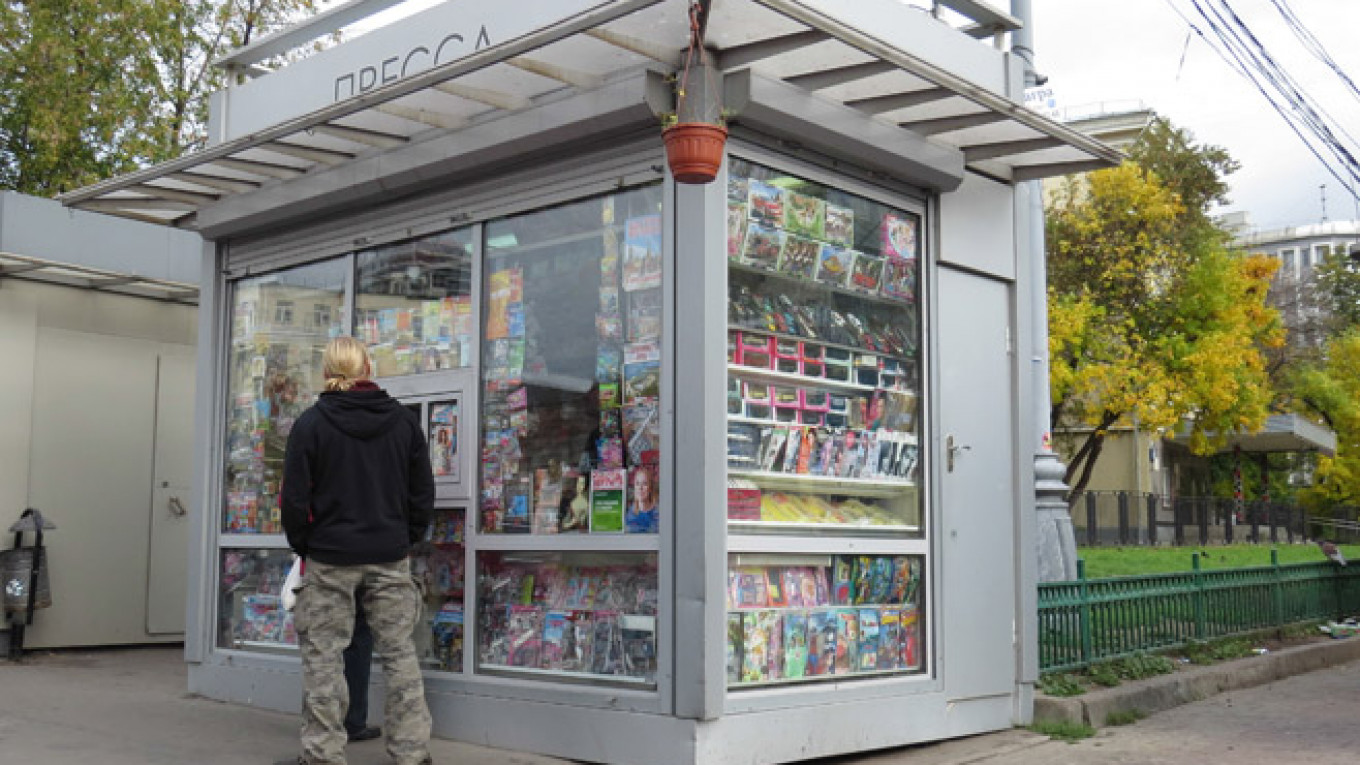City Hall's new offensive against street kiosks this year will refresh Moscow's image, but strain the city's budget and push the last remaining small-time retail entrepreneurs out of business, kiosk owners said Monday.
Moscow's 8,000 kiosks, which sell everything from flowers to ice cream, will be gradually replaced this year with new ones bearing improved design and equipment, the head of City Hall's property department, Vladimir Yefimov, told an Interfax news conference last week.
"The process will pass painlessly, within the next 6 to 9 months," Yefimov said, adding that existing kiosks will not be demolished until their land rental contracts expire.
The city will fund the building of new kiosks, and interested entrepreneurs will be able to rent them for 5 years through online auctions, according to Yefimov.
The result will be a reduction on ugliness in Moscow, he said.
Heard it Before
But City Hall has targeted street vendors before, and kiosk owners still in business after the last overhaul decimated their ranks in 2012 were not as optimistic.
"This is all very well, but who will reimburse the investment I made in constructing a flower kiosk, which was built under city's guidelines just three years ago?" said Ilya Kuznetsov, who owns a chain of kiosks selling bread and flowers. "The authorities approved the design then, what happened now?" he said.
Kuznetsov has been in the small retail business for 20 years and has seen kiosks in Moscow evolve from tiny shops on wheels into sometimes large, glass-walled pavilions. He is also a veteran of a series of battles waged on kioskers over the last years by city authorities. He was even recently detained for protesting against policies that were killing his business.
When Sergei Sobyanin replaced the city's boss of nearly two decades, Yury Luzhkov, as mayor in 2010, kiosks began to be demolished. Sobyanin's City Hall said they ruined the look of the city, and brushed aside the permits given to kiosk owners under the previous administration.
In 2012, City Hall passed a decree that standardized requirements for various types of kiosks. Shops that failed to meet the requirements were flattened. Many said the reform was designed to benefit big retail chains that, aside from anything else, are more reliable taxpayers.
"Now they are simply doing this again, and we will see no compensation for our investment. There was none before," Kuznetsov said.
He said that for a legal business paying monthly salaries and rental fees it was impossible within the three years between the 2012 decree and the new face-lift plan to make a return on the money spent setting up shop.
The cost to build and equip one such kiosk starts from 500,000 rubles ($7,600) and could go up to 1.5 million rubles, businessmen said.
"This is a lot of money for small businessmen to throw away, and some had to take a loan to fork it out in the first place," said Sergei, a co-owner of what used to be an open-air market in northern Moscow who did not want his surname published.
Two years ago his spacious market was demolished, despite a 49-year land rental contract that still had years to run. Sergei said he was suing the Moscow government for compensation in court but was doubtful he could win the case.
"We do not have an independent judicial system. Because if we had one, these officials would have been out of their office and some of them in jail," he said.
Budget Under Strain
Besides hurting the interests of small business, the new kiosk replacement plan in Moscow will take a deep bite out of the city budget, already strained by a sharp economic downturn.
"Just two months ago, when a law on an additional sales tax was being lobbied through [parliament] they told us the budget was running thin. And now suddenly money is found for new kiosks," said Vladlen Maksimov, the president of Coalition of Kiosk Owners.
Multiplying the 8,700 new kiosks planned for Moscow this year by the minimum sum of 500,000 rubles for construction per outlet gives a total of at least 4.3 billion rubles ($65 million) that would have to be gleaned from state coffers.
But even if City Hall has the money available and is willing to spend it, there remains a question of why this is so urgent.
"There are still no city-owned kiosks built to replace the existing ones. Why are they willing to destroy already-working business so fast?" Maksimov said. "This will mean firing all employees and closing down production and warehouses to make place for something yet to be built."
City Hall's policies towards small-time retailers have already taken a heavy toll on their numbers.
In 2010, depending on estimates, there were from 20,000 to 35,000 kiosks in Moscow. Now, less than a third remain, and businessmen only expect further contraction as rental rates rise, policies tighten and costs outweigh the returns.
"I have already been forced to lay off 60 of my employees in the last two years and my business is small," Kuznetsov said. "One would think that all these people could find jobs at other kiosks but they did not, they all either sit at home or have left the country."
Contact the author at a.panin@imedia.ru
A Message from The Moscow Times:
Dear readers,
We are facing unprecedented challenges. Russia's Prosecutor General's Office has designated The Moscow Times as an "undesirable" organization, criminalizing our work and putting our staff at risk of prosecution. This follows our earlier unjust labeling as a "foreign agent."
These actions are direct attempts to silence independent journalism in Russia. The authorities claim our work "discredits the decisions of the Russian leadership." We see things differently: we strive to provide accurate, unbiased reporting on Russia.
We, the journalists of The Moscow Times, refuse to be silenced. But to continue our work, we need your help.
Your support, no matter how small, makes a world of difference. If you can, please support us monthly starting from just $2. It's quick to set up, and every contribution makes a significant impact.
By supporting The Moscow Times, you're defending open, independent journalism in the face of repression. Thank you for standing with us.
Remind me later.






